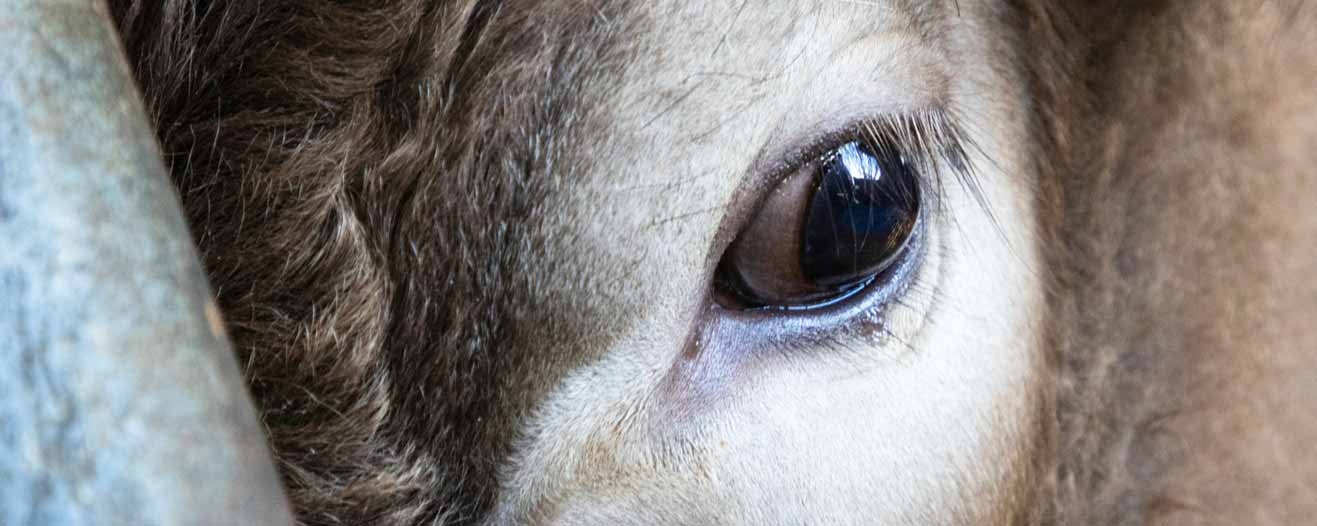- Find a Pet
- Advice and Welfare
- Ways to Give
- Get Involved
- What We Do
- Search
- My RSPCA
- Report a concern
- Gift in Wills
-
Colour modeVivid Calm
- Home
- Advice and welfare
- Farm animals
- Slaughter
Farm animal slaughter
All farm animals deserve a humane end to their lives. We're working in a number of ways to try to ensure this.
Animals can be vulnerable at time of slaughter, so it's vital they're treated properly and killed humanely. This includes being stunned correctly so they remain unconscious and can't feel pain before being slaughtered.
We're very concerned about the welfare of farm animals at the time of slaughter. Here are some of the main reasons why.

Stunning of large animals
There's a risk that some cattle, pigs and sheep may not be stunned effectively, causing them to regain consciousness before they die from blood loss. For stunning to be effective, it's vital that:
- the stunning equipment is working properly – it should be regularly checked and maintained
- the stunning equipment is positioned correctly on the animal's head/head and back
- enough current is applied during electrical stunning and for a long enough period
- the correct cartridge is used to fire the captive bolt during captive bolt stunning
- the time between stunning and sticking isn't too long – so animals don’t regain consciousness.
Stunning of poultry
There are complex problems surrounding the stunning of poultry. We're particularly concerned about the use of electric water bath systems, as these involve the painful shackling of birds while they're conscious. The way they're designed can result in some birds missing the water bath stunner or receiving painful pre-stun shocks as they enter the stunner.
This system can also mean there's not enough electrical current flowing through the bird's body to ensure they’re unconscious. The system can also be designed so that birds passing through an automatic neck cutter only receive a single cut to the neck, which reduces the rate of blood loss.
The water bath system can also result in birds accidentally missing the automatic neck cutter. If these birds aren't noticed by the slaughter person, they may still be alive when entering the scalding tank – a tank of boiling water that helps to loosen the feathers prior to plucking.
We're also concerned about some gas-killing systems, as these can mean that conscious birds may be exposed to highly aversive levels of carbon dioxide gas.
Slaughter without pre-stunning (religious slaughter)
Read more about what we're doing on the issue of religious slaughter.
CCTV in slaughterhouses
Installing CCTV in abattoirs is a requirement of our own welfare standards for farm animals. CCTV is required in every slaughterhouse in England and Wales in all areas where live animals are present.
Working to improve animal slaughter practices
We believe that slaughter practices must be improved and the law properly monitored and enforced to ensure all farmed animals have a more humane end to their lives. We're working to try to achieve this.
Engaging with governments and the food and farming industries
Our Farm Animal Department staff visit abattoirs, view the practices, and give advice on how animal welfare improvements could be made. Our specialist staff also engage with governments, food retailers and the slaughter and farming industries to encourage change for the better.
Developing welfare standards for farm animals
We're able to improve the lives of millions of farm animals each year using our RSPCA welfare standards for farm animals. We've developed these for 10 of the major farmed animals in the UK and they include hundreds of requirements to ensure higher standards of welfare for all those animals reared in line with them. Each document includes requirements, informed by scientific evidence and practical experience, to ensure humane handling and slaughter/killing.



